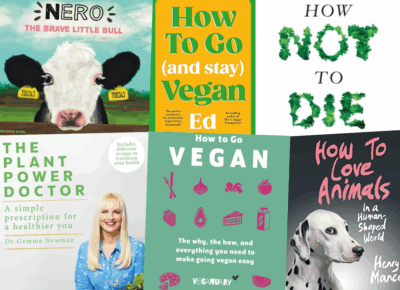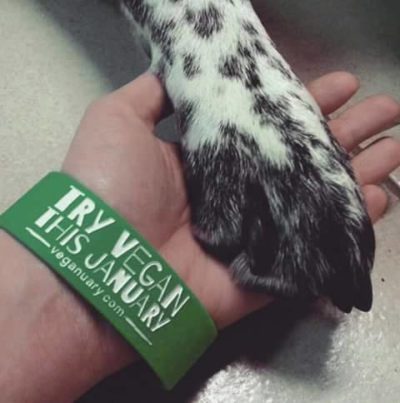Humans can’t survive without meat, right? Well…that’s not quite true. As an outspoken supporter of animal welfare organizations and a believer in the sanctity of life, Richie Kul regularly gets quizzed on his stance on various animal-related issues. Here, he tries to dispel some of the most pervasive myths he encounters.

As an outspoken supporter of animal welfare organizations and a believer in the sanctity of life, I regularly get quizzed on my stance on various animal-related issues, from the virtues and extremes of a plant-based diet to animal testing to the exploitation of animals in the fur, leather, and wool trades. These questions have run the gamut, from the cordial and genuinely interested to the combative and antagonistic.
And I get it. Being challenged or introduced to something new can be jarring and disorienting, especially when it’s a movement that has gathered great momentum in recent years. But when the case is presented with empathy and tempered conviction, there is no win or lose as everyone wins when we adopt a diet and lifestyle built on compassion and good, clean nutrition.
As an actor/model who’s lent his image and words to a number of animal rights campaigns and is an endorser of the Veganuary and U.S. Veg Week initiatives, I’ve had the opportunity to engage with many people on the issues of animal welfare and going vegan. As is normal when discussing a topic many times over, several themes continually surface in my conversations with friends and acquaintances and so I thought I’d take a moment to share with animal lovers and veg-curious folks alike some common thoughts and concerns encountered and my take on things:
“Eating meat is part of the circle of life and the way things are. Animals do it too.”
Yes, agreed – in the wild, animals hunt for survival and it can get downright savage. But the thing is, you are not Timon, I am not Pumba, and we are not in The Lion King. The beauty of being human is that we are gifted with the capacity to discern right from wrong and the free will to act accordingly.
I like to quote John F. Kennedy, who wisely said, “To those whom much is given, much is expected.” In the animal kingdom, we two-legged folk certainly got the long end of the stick, so why not be caretakers of our fellow creatures rather than ruthless exploiters of them? When whole swaths of people from Hindus in India to strict Buddhists in Taiwan have demonstrated the ability to live full and vital lives based on a vegetarian diet, why be the perpetrators of needless suffering if it can be easily avoided?
The lion may need to kill the gazelle to live another day, but humans can survive just fine without butchering Babe, Nemo, or the gang from Chicken Run.
As for it being the way things are, I totally get it. I was raised eating meat and for a long while never made the connection between the food on my plate and the being that just days or weeks ago was moving, breathing, and interacting with the world.
Once I awakened to that reality, I began to see patterns in history where behaviors were justified because of tradition. Women and African Americans securing the right to vote, interracial marriage (and soon hopefully, marriage equality for same-sex couples) – all these present-day no-brainers were previously thought to be outlandish and only came to pass in just the last hundred years.
“If I go meatless, I won’t have anything to eat. I’ll waste away.”
Not so! Would it surprise you to learn that the world record for most consecutive situps (17,003) was set by Alan Jones, a vegetarian? There’s a reason that Brad Pitt, Al Gore, Ellen Degeneres, James Cameron, and a host of other public figures have adopted a plant-based diet and are extolling the virtues of going cruelty-free.
Bulls, elephants, and most primates are vegetarian and no one would accuse them of being weak or infirm. There’s a reason for the widespread hesitation, that being the popular perception that vegetables lack the vital nutrients to grow and sustain muscle. And therein lies a major fallacy, for 100 calories of broccoli contains 11.1 grams of protein vs. 6.4 grams for 100 calories of beef and other plant-based foods demonstrating that same capacity to more than adequately nourish our bodies.
As long as we eat smart and deliberately, it’s possible to thrive on a vegan diet. In fact, many newbies report improved energy levels and skin. Pretty nice side benefits, if you ask me!
“Plants have feelings too, you know…”
Ah, this statement often arises when confronted by someone who wants to needle and antagonize but sometimes people pose it innocently too. In any case, worth addressing. My first reaction is “Really?!?” to which many people respond with sheepish grins and some blushing.
We are instinctively wired to empathize with people like us, and with hearts, lungs, and blood coursing through their veins, animals are remarkably similar to us. They form attachments with one another and their “caretakers,” have good days and bad, and feel joy/fear/pain just like the rest of us.
And if you read Bob Comis describing the angst that pigs endure when their comrades are taken away, you know that those bonds are very tangible and real.
When you pluck a leaf from a tree, said tree often finds new pathways for growth and will many times be stronger for it. Cut off a limb from a cow or chicken? It’s not growing back. While our compassion and respect shouldn’t be predicated on whether other animals are similar to us, I like to invoke our intrinsic gut feeling when this question is posed.
If you were called upon to pluck apples from an orchard or carrots from the Earth, would you have any moral reservations or misgivings? What about leading an animal from a pasture or pen, loading it on a truck, and ending its life at the end of a bullet or a sharp blade?
The defence rests.
“I love my dog or cat, but pigs and chickens are different.”
This is why my work with Change For Animals Foundation, Soi Dog, Animals Asia, and In Defense of Animals is particularly poignant for me. When you see those scared faces poking out of cages on slaughter-bound trucks, the first response is generally outrage.
That’s a dog! How could they? They do because they can, and this is a similar rationale that justifies the oppression and exploitation of countless other sentient, loving creatures each and every day.
Pigs are remarkably thoughtful, affectionate, and determined by many to be more intelligent than our beloved canine companions, while chickens have demonstrated the ability to draw references, apply logic, and plan ahead. Whoa, that’s lightyears ahead of many humans, I know!
All of these beautiful beings, whether they have glossy soft coats, floppy ears, or button noses instead of snouts or beaks or feathers, have a desire to live and be loved. So why be selective in our compassion when non-animal-based products abound?
“I try to get humanely raised meat. Isn’t that enough?”
It’s certainly a step in the right direction. I like to say that some effort is better than none at all and when people proactively try to limit their intake or factor in the well-being of the animals they eat, I applaud that. But make no mistake, animals at humane farms aren’t cuddled and smooched into nuggets and filets.
They meet the same fate that industrial farm animals do, and those last moments are violent and traumatic. Humanely raised is a concept developed to assuage yuppie consciences and it has been quite effective in doing so but it still doesn’t take the primitive notion away of growing and nourishing a being only to ultimately rip it apart and devour his or her flesh.
If you were planning to scrap a car in three to nine months’ time, would you take very good care of it? The mentality that humane farmers love their little charges is a rather ridiculous one because you don’t intentionally hurt or harm those that you love.
“Animals are going to get killed anyway; what’s the point of me saving some of them?”
This is the same logic that people use when it comes time to vote in national elections (which we all know we should do right?). “I’m just one person, I won’t make a difference.” And, yet, this illusion of powerlessness often makes people hesitant to go veg or to retreat back to eating meat once they’ve already crossed over.
Each time we place an order at a restaurant or do our grocery shopping, we make a statement, a loud and resonant financial one, and those purchasing behaviors govern purchasing decisions by that store or restaurant which affects the rate at which farms breed and slaughterhouses kill.
It’s like a trickle-up effect and an illustration of the law of supply and demand on full display. What we eat matters and as a vegetarian, it is often quoted that we single-handedly save 100 animals a year from being killed. Pretty remarkable if you ask me. A drop is still a drop, but it has the capacity to be a pretty darn remarkable one.
While I hope these rebuttals to often-asked questions help shed light on the reasons vegetarians are compelled to leave animals off their plates, at the end of the day, the best way to deal with sceptics and naysayers is to have your amazing life be your own testimony. When you live a happy, vibrant, healthy life full of energy and contentment, you do more to advance whatever cause is dearest to your hearts because people around you will actively seek out the secret behind the positive force you project to the world.
Richie Kul is an American actor and model most noted for his star turn in the critically acclaimed movie “Pearls of the Far East”. This article was originally written for One Green Planet. For more myth-busting please visit the Veganuary FAQs section.
IMDB Actor Profile: http://www.imdb.me/RichieKul
Facebook: http://www.facebook.com/RichieKul
Twitter: http://www.twitter.com/richkul




